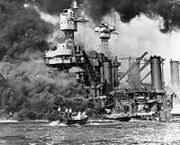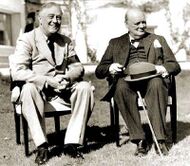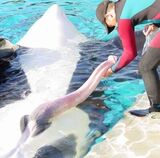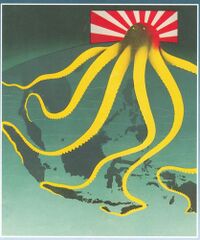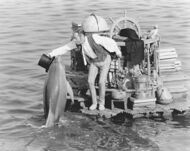The Doolittle Raid
November 26th, 1941: Six aircraft carriers escorted by two battleships, three cruisers, nine destroyers and a host of submarines and ancillary craft slip into the night. They carry a cargo of 400 aircraft eastwards, across the mighty Pacific Ocean. They are heading for Hawaii. Despite strictly enforced radio-silence, American intelligence is aware of the fleet's progress. However, it briefs the President that the fleet is:
"Merely delivering HD TVs and replacement Toyota brake pedals."
In less than two weeks they reach their target and deliver instead a twelve thousand pound, highly explosive declaration of war straight to Pearl Harbor. The nation is astounded and mourns the loss of men and materiel. Suddenly, the Second World War is a much less friendly place for Americans.
President Roosevelt's astonishment is absolute. On news of the full extent of naval losses he slips into near despair, declaring that:
"The Japanese have, on this day, shown they have it infamy."
He summons the Joint Chiefs of Staff and demands immediate vengeance, the loss of 4 battleships, 200 aircraft and his house keys hanging heavy on his mind. He is determined that America should have its revenge and from this determination came one of the most astonishing episodes of World War II.
Fight fire with fire
Naval officers insisted that the surviving carriers could not attack Japan while the rest of the Pacific fleet were still slowly settling onto the ocean floor. FDR was furious at his impotence to respond in kind. Days later, Germany's declaration of war brought a visit from Winston Churchill and the two world leaders embarked on a prolonged whisky binge. From this event emerged a plan audacious even by the standards of the 1940s - a B25 would be transported across eight thousand miles of ocean on the back of a specially equipped Sperm whale. Invisible to radar, the whale would launch a deadly fire-storm directly into the heart of the Japanese homeland.
"S' fucking brilliant." Churchill told his aides after FDR had passed out. "The slant-eyed shits'll never know what hit 'em. Now, where can a man order a kebab in this God-forsaken country?"
The Joint Chiefs were astonished by both the imagination of the plan, and its inherent stupidity. Familiar with Roosevelt's flight of drunken fancy they immediately demanded its suppression, issuing strict orders to junior officers that they should "DO NOTHING". While Churchill and FDR sobered up and scraped the vomit from the carpet of the Oval Office, an overworked clerk mistakenly filed the plan under "Doolittle" from where it found its way to Dr. John Doolittle, a former animal doctor and musical theatre star now working in Air Force intelligence due to poor DVD sales.
Within months, despite Japan extending its reach to New Guinea, Burma and Guadalcanal, the USAAF had responded to Tojo's treachery, dropping a payload of 437 fire-crackers, 12 cigarette butts and an anvil over Tokyo. The Japanese public were outraged by the US aircrew's chewing gum befouling their pavements and would never again sleep soundly in their beds for fear of annihilation from above. Vengeance was sweet.
The plan
Quite how the plan made its way to the desk of Dr John Doolittle is uncertain; Doolittle's later claim that it was delivered by tame sparrows is unverified and coincided with the onset of Alzheimer's disease. What is certain is that, almost alone in the US military, he saw the plan as an opportunity. When superior officers refused to countenance the mission, Doolittle began to recruit for himself.
His first act was to use his uncanny ability to talk with the animals to recruit a suitable whale. To do so he commandeered three Orcas from the San Diego Sea-life Center. After an extensive briefing-session he sent them North, South and West in search of a suitable candidate. A fourth agent, a Pacific harbour Porpoise (Pinky), died tragically after swimming into the Mojave Desert - the first casualty of the daring plan. Doolittle blamed himself for the miscommunication that resulted in Pinky having been sent East.
"Pinky may have lived had I only taken the trouble to learn how to speak Porpoise as well as Orca!" he admitted in his memoirs. "But time was short and he kept nodding and smiling, so I assumed he understood what was being said. It was a devastating loss so early in the plan, I've never forgiven myself. After all, what is life if it has no Porpoise?"
Spirits were raised by the arrival of a spunky, young Sperm Whale (Manjoos) who agreed to transport the plane, its cargo of bombs, the specially prefabricated flight-deck and a seemingly endless mass of jostling seamen. With the transport arranged, Doolittle needed only a plane and a crew to fly it. Refused access to military personnel, the doctor had no alternative but to turn to his extended family and friends.
As if God himself was answering his prayers, Doolittle's ancestor, Eliza, arrived from the nineteenth century. She and her father, Alfred, had fled the anarchist madness of 1880s London and were more than happy to take part in return for shelter. Dr John was pleased to note that Eliza's former life as a match-seller gave her some incendiary experience but knew that his task was far from complete. The minimum crew for a B25 included a pilot, co-pilot, navigator, bombardier and tail gunner. There were two more spaces to fill. Fortunately, within hours two arrivals from the future solved the problem: Frank Black had returned to the 1940s from 1989 in an attempt to break a long-standing heroin problem only exacerbated by the Pixies long tour in support of the Doolittle album; accompanying him Melinda Doolittle was free to take part in the raid following her elimination from series 8 of American Idol, a mere 65 years after the raid was scheduled to take place.
With all places filled there was nothing to stop the plucky crew from giving Nippon a taste of its own medicine. They celebrated long into the night adapting Eliza's favourite song to mark the occasion:
| “ | All I want is a plane somewhere, Dropping bombs through the cold night air. Singe-ing Hirohito’s hair, Ow, wouldn’t it be loverly? Lots of phosphorus to light the fire, Barrels of tar make the flames grow higher. Just one enormous pyre. Ow, wouldn’t it be loverly? Ow, so loverly flying ever so far, Watching women and kiddies char. Try not to land in Manchuria. Ow, wouldn’t it be loverly? Loverly, loverly, loverly, loverly! |
” |
A tense journey
As soon as Eliza had completed basic flight-training, they were ready to go. Frank Black was collected from a Chinese-American opium-den in San Francisco and, while the crew loaded up the adapted B25 with its deadly payload, Alfred Doolittle thoughtfully drilled a small hole through the flight deck above Manjoos' blow-hole to allow him to breathe.
Still three days from their take-off zone, tragedy was only narrowly avoided when Manjoos briefly dived to a depth of thirty feet in pursuit of a particularly fragrant comb-finned squid. However, this allowed the crew to avoid detection by a Japanese picket-boat stationed 650 miles off the east coast of Kyushū. Manjoos deliberately surfaced beneath the patrol boat, breaking its back. The plucky raiders boarded the stricken vessel, causing most of its crew to abandon ship rather than surrender. The captain barricaded himself in the bridge but Melinda Doolittle's forceful rendition of "Nutbush City-Limits" forced him to commit ritual suicide by plunging his katana into his own ear.
Fearing that the patrol had radioed news of the mission to Japan, Dr Doolittle ordered immediate take off. The engines of the B25 throbbed and Manjoos leaped into the air to give the heavily laden bomber extra lift as it juddered to the end of the improvised run-way. For a few moments, the bomber skimmed the waves but slowly it began to climb. Manjoos bid a final farewell to the craft he had christened Fickle Flipper of Fate before turning to savour the taste of a mouthful of jetissoned Japanese seamen.
For what seemed hours the plane headed west in an eerie silence broken only by radio hiss and the muffled cries of Melinda Doolittle, bound and gagged to preclude any repeat of "Lady Marmalade". Suddenly, Frank Black spotted flight of Japanese Zeros in the distance. They were still 120 miles east of their target but Eliza calmly steered the B25 into cloud cover, steadying herself by repeating the improving mantra taught to her by Professor Henry Higgins:
In Hokkaido, Honshu and Hiroshima,
We'll hit Hirohito hard.
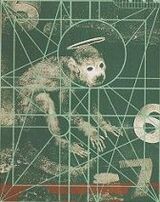
Moments later the crew panicked as ear-splitting screams of anguish threatened to break the intercom. Eliza banked steeply left and began evasive manoeuvring, fearing that the patrol had spotted them. Upset beyond rationality by Black's injured screaming, Alfred clambered bravely to the rear to pull him from the tail-gun position, the screams growing louder and more distressing as he squeezed past the dangerous munitions in the hold. His relief was indescribable when he discovered The Pixies' frontman was merely rehearsing a new verse for "Debaser" and the crew's nerves slowly subsided as they approached the coast.
The five brave souls held their breath as they honed in on the Japanese capital, scarcely able to believe the lack of resistance. The silence in the plane became intense. Alfred feared that Frank Black might begin to sing again and so filled the aural vacuum with a good old-fashioned Cockney knees-up ditty, complete with cheery racism:
| “ | Let's drop incendiaries in the morning! Boom, Bang! Tokyo’s gonna fry. Let loose the payload, Watch heathens explode. And get me out of here quick time! |
” |
The Escape
There had been little resistance over Tokyo, a city whose citizens had been told that they were surrounded by an unbreakable ring of steel but which was guarded by not a single anti-aircraft battery. The highly combustible nature of many Japanese buildings made any fire a potential disaster and the tons of widely dispersed munitions dropped from The Fickle Flipper of Fate scorched several Tokyo blocks and left dozens of its citizens slightly miffed.
The lumbering B25 and its brave crew plunged on over the Sea of Japan knowing that their enemies would by now be scrambling every fighter between Kyushu and Korea. There seemed nothing left to say. Eliza studied the horizon with fearsome intensity while the rest of the crew occupied their minds as best they could: Alfred sewed buttons onto his specially commissioned Pearly King flight-suit, Dr Doolittle absent-mindedly scanned animal porn, while Frank Black slowly honed his dagger to a fine edge should the worst come to the worst and he be forced to cut out Melinda's tongue.
Perhaps it was this repetitive action that lulled Black into a coma. Or perhaps it was the morphine he had discovered in the flight medical kit. Either way, it seems unlikely that a conscious tail-gunner could have missed the wing of thirty six Kawasaki Ki-45 "Toryu" fighters that slowly gained on The Fickle Flipper as it laboured towards Seoul. One by one the enemy aircraft strafed the B25 without Black returning fire. Alfred once again crawled rear only to find the tail-gunner seemingly unconscious and mumbling repeatedly "Where is my Mind?". As the old man tried to push the stricken singer out of the way and assume his position at the machine-gun, a rent tore across the fuselage of the B25, threatening to tear it in two. With no alternative, Alfred leapt into the front of the plane pulling Black with him. He heaved a momentary sigh of relief before watching in horrified awe as the tail-unit ripped away from the air-frame and plunged seawards. Black merely dribbled onto the floor and mumbled:
| “ | Yoo hoo, Look at me! There goes my gun, There goes my gun, There goes my gun, Friend is foe. |
” |
Without a tail-unit, try as she might Eliza could not keep the plane straight and it was clear that they would soon crash. At moments of crisis, the clear head of a British gentleman is at its best. Dr Doolittle assumed control of the craft from the co-pilot's position. He urged his companions to parachute to safety while he hauled the B25 into a final steep climb and lashed Melinda to the bomb-sight. With most of its fuselage now in flame, the gallant doctor only bailed out himself when the plane stalled and began its last descent.
Of the five brave crew, only Dr John Doolittle made it back to the USA to tell the tale, escaping on an improvised life-raft pulled by a bottle-nosed dolphin. Frank Black survived the fall, having been helped into a parachute by Alfred but sank like a stoner and was presumed drowned. Alfred was captured and tortured with raw fish to accompany his chips before being executed in a prisoner of war camp in 1943, Eliza was beaten and saw out the war as a "Comfort Woman", succumbing to syphilis in 1945.
In a wider context, 10,000 Chinese prisoners were decapitated in retribution over the following months. And yet an ineffective, token-gesture had been made. Japan would never look invincible again, particularly not to the headless peasant corpses strewn across Guangdong.
| Featured version: 16 August 2010 | |
| This article has been featured on the main page. — You can vote for or nominate your favourite articles at Uncyclopedia:VFH. | |
